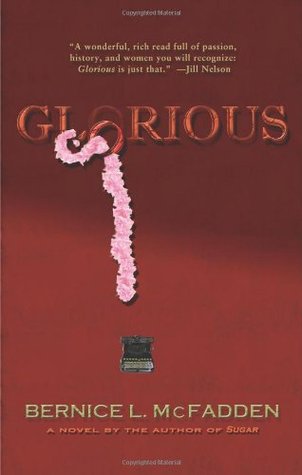There is something so intensely satisfying about finally reading a book that has been lingering on one’s TBR list for years and years. For the book to be as good as Bernice McFadden’s Glorious is just the cherry on top of an already almost perfect ice cream sundae experience.
(I read another book that’s been on my TBR list for four years — The Pendragon Legend, by Antal Szerb — and learned that right now is not a good moment for me to be reading books published in 1934 with all the attendant sexism that implies. Ha ha I wanted to fling it across the room and then stomp on it, only I was reading it on my Nook.)

Glorious is the story of a girl called Easter who leaves her hometown because it’s unbearable there, and then leaves the next two towns where she works because it’s unbearable there, and then washes up in New York City just in time for the Harlem Renaissance. Easter is a writer, at a time when the world is not kind to poor black women of remarkable talent. In the acknowledgements to the book, McFadden writes that she was inspired by Zora Neale Hurston (who died in poverty) and Nella Larsen (whose writing career was derailed an accusation of plagiarism).
I read Glorious while on a beach vacation, and I recommend that y’all do the same if possible, because it’s a tough read. Easter faces unspeakable tragedy in her hometown and her family, and a subsequent chapter includes a brutal depiction of one of Easter’s friends being lynched. McFadden doesn’t shy away from depicting the realities of racial violence and hatred in the early twentieth century — neither the open violence in the South nor the more covert government interference with black activism in Harlem itself. McFadden even squeezes in a cameo from Ota Benga.
I read Glorious and We Were Eight Years in Power on the same day, and it was an unexpectedly apt pairing. McFadden depicts many of the strategies Ta-Nehisis Coates has identified for keeping black Americans in poverty and fear, all through the life of one fictional fiction-writer whose world conspires against her receiving her due as an artist. Despite the difficult subject matter, I’m very glad I read it (at last!!).